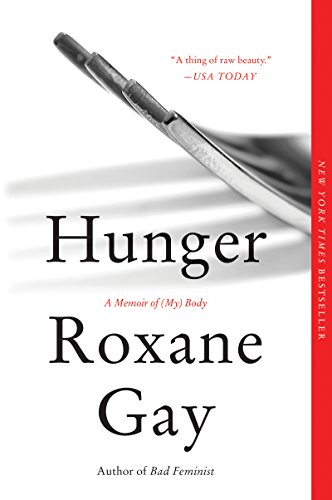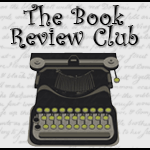
“What you need to know is that my life is split in two, cleaved not so neatly. There is the before and the after. Before I gained weight. After I gained weight. Before I was raped. After I was raped.”
When Roxane Gay was twelve years old, a boy she trusted led her into the woods where he and his friends gang raped her. Underestimating the love of her Catholic family, she told no one about her rape but instead turned to food for comfort, and over time, her body became both a fortress and a cage for her. At her heaviest, Gay tells us early in the book, she weighed 577 lbs as a twenty-something. Hunger chronicles her complex relationship with her body. We see Gay as a sheltered child, as an intelligent yet damaged adolescent, and as an accomplished woman haunted by what she calls “the girl in the woods.”
My body issues are different from Roxane Gay’s. While she has had doctors write her medical diagnoses as primary diagnosis “morbid obesity” and secondary diagnosis, “strep throat,” I have gained and lost the same 30 pounds repeatedly over the years. While she and I might be in different BMI classes, I did relate to her memoir. I, too, have lived in fear of my own hunger, of the knowledge that my hunger for food might actually hint at deeper problems. I, too, have always felt my body to be unruly, something never quite within my control, or as much in control as is possible in world where cancer or crippling car accidents can happen to anyone.
While I definitely related to so many parts of this, it was definitely a learning experience for me. My issues with weight have been fairly superficial, such as not fitting into the shorts I want to wear, while Gay’s are more everyday and immediate, such as will she fit in the only chair that is offered to her? Hunger brings awareness of what life is like for those in “unruly bodies.” Gay talks about the problem of airline seat sizes, and also the embarrassment of being unable to keep up with friends when walking as a group to a destination, or never being able to sit on an unfamiliar toilet seat for fear of breaking it. People can’t address these types of everyday inequalities until they are aware of them.
While I was reading Hunger, we had an evening full of rain in Michigan, followed by a drop in temperature, which turned all roads and sidewalks into ice. Every school district was closed, but predictably the university I work for remained open. I was signed up to attend a session on white privilege that morning (which out to be about privilege in general). Our presenters gave us this exercise where we were in groups with randomly assigned amount of money, and we could buy privileges. The privileges ranged from being able to practice your religion to being being able to hear radio stations in your native language. What I noticed after we all shared what privileges we had chosen was that none of us had chosen were those dealing with able-bodiedness. Why had none of us selected it? Because we were all so able bodied that we were able to get to a random building in the middle of an ice storm, so we didn’t think about the limitations of the body because none of lived that reality. Had the sidewalks not been covered in a sheet of ice and less able bodied people had been able to get to the session, our choices probably would have looked different and the able bodied attendees may have learned something new from their peers.
Similarly, Hunger provides a perspective that is needed. We all need to be able to understand the struggles of people who live in bodies different from ours, whether it’s due to weight or physical disabilities or some other factor. We need to examine what we assume about other people’s bodies when we don’t know their stories.
I do recommend this book. The obvious audience is people interested in women’s issues and body image. It would be helpful to medical professionals, as obesity stigma is common in the medical profession. (It will actually be a work book club selection at the School of Public Health where I work.) But everyone lives in a body and could benefit from reading Hunger.
FCC Notice: I purchased my own (Kindle) copy.
book review blogs

This sounds like a great read. Interesting experiment you did as well on buying privileges. I broke my ankle in 3 places last winter sliding down my icy front steps (I am in Michigan too), so I lost all mobility for 11 weeks. My perspective then would be different than then it would be today….And I have had it with this Winter! 🙂
LikeLike
What an thought-provoking review. Thank you for relating the book to your own life and to the seminar you attended. It is interesting that no one in the seminar “bought” able-bodiedness. I’m reading Pure, btw. 🙂 Thank you for reviewing!
LikeLike
Yes, a very thought provoking review. I appreciate your person perspective. Tweeted and shared.
LikeLike
Excellent point about taking able bodies for granted. I loved this book too and reviewed it last year: http://blog.sarahlaurence.com/2018/06/hunger-by-roxane-gay.html
LikeLike
I’ve struggled with extra weight my whole life. Trauma hasn’t driven me to it, it’s more a lack of self control. Fortunately my health is good and I’m able bodied. – Margy
LikeLike
Great review, Stacy! This is another book that’s on my TBR that I haven’t yet gotten around to (and may just be avoiding). I suspect I’ll have many feelings with a capital “F” about this one. 🙂 Have you read any of her other books?
LikeLike